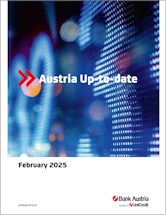After revision: slight GDP growth expected for 2025

- Chance of small GDP growth in 2025 increased after revision of previous year's data
The latest revision of GDP by Statistics Austria shows a somewhat more favourable picture of the past economic situation. We continue to expect slight growth in the Austrian economy for the rest of the year. As a result of the revision of the previous year, GDP now rose slightly by 0.1 percent for the year as a whole, with the GDP forecast remaining unchanged. Expectations for 2026 remain low as a result of US tariff policy, but we still expect economic growth of 1.1 percent. - Unemployment rate expected to rise to 7.5 percent in 2025
In view of the ongoing economic challenges, a further deterioration of the situation on the labour market is to be expected in the coming months. We assume an average unemployment rate of 7.5 percent for 2025. For 2026, we continue to expect stabilization at this higher level. - Budget deficit will continue to exceed 4 percent of GDP in 2025
The announced austerity package of 6.4 billion euros or 1.3 percent of GDP for 2025 will only slightly reduce the budget deficit in 2025. According to the official budget estimate, we expect a budget deficit of 4.5 percent of GDP for 2025. - Energy prices support inflation decline
In the first five months, inflation rose to an average of 3.1 percent. We expect inflation to gradually slow down in the coming months. We expect inflation to average 2.5 percent in 2025 and 1.9 percent in 2026. However, the forecast risk is now clearly pointing upwards. - Another interest rate cut expected by the ECB
At its June meeting, the ECB decided to cut key interest rates further by 25 basis points, as the burden of higher US tariffs outweighs the positive growth impulses from a more expansionary fiscal policy in Germany and at the EU level. We therefore only expect one further cut in September, which should mean that the deposit rate should reach its low at 1.75 percent.
As of June 2025.
About Austria Up-to-date
The information provided by Bank Austria in our publication “Austria Up-to-date” includes current economic forecasts and the most recent data for key indicators, in some cases in the form of charts. The key indicators are supplemented by regular comments, and their impact on the forecast is analysed in this report.
These publications do not constitute investment advice, investment recommendations, marketing communications, or financial analysis. In particular, they are not an offer or solicitation to buy or sell securities and do not constitute a solicitation to make such an offer. They are intended solely as initial information and are no substitute for advice based on the individual circumstances and knowledge of the investor.
It is an analysis based on publicly available economic data. Despite careful research and the use of reliable sources, no responsibility can be taken for completeness, correctness, timeliness and accuracy.
Any investment in securities involves risks. The value of the investment and the income from it may fluctuate suddenly and substantially and therefore cannot be guaranteed. There is a possibility that the investor will not get back the full amount invested, particularly if the investment is held for only a short time. In some circumstances, a total loss is also possible.
Possible (return) payments from the product may not protect investors against inflation risk. There can be no assurance, therefore, that the purchasing power of the capital invested will not be affected by a general increase in the prices of consumer goods. Figures and information on performance refer to the past and past performance is not a reliable indicator of future results.
Only in the context of an investment advisory service can UniCredit Bank Austria AG take into account the personal circumstances of the customer (investment objectives, experience and knowledge, risk appetite, financial circumstances and financial loss tolerance) and carry out a product-specific suitability test.
We would like to point out that the tax treatment depends on the personal or company circumstances of the investor and that the information on tax advantages is provided on the basis of the current legal situation, which may be subject to future changes and for which no information can be given as to whether they will be continued.






